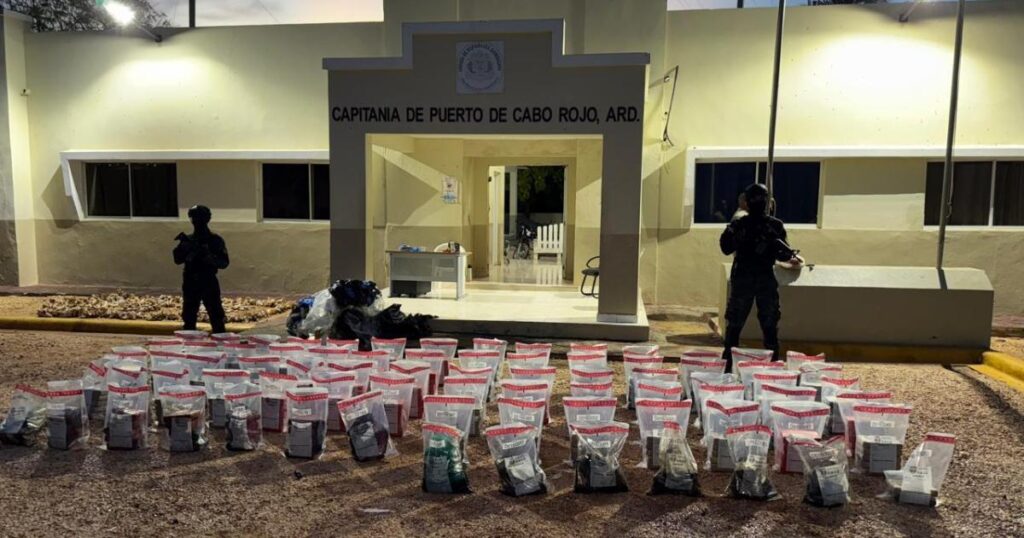Dominican Republic forces have seized hundreds of cocaine packages from a speedboat that was targeted and destroyed by the United States Navy, officials said, amid escalating anti-drug operations in the Caribbean.
In a post on X on Sunday, the Dominican Republic’s National Directorate for Drug Control (DNCD), the country’s drug enforcement agency, said it carried out a joint Dominican-US operation in which they said they recovered 1,000kg (2,200lb) of cocaine in 377 packages.
The statement said the vessel carrying the contraband was destroyed approximately 80 nautical miles (150km) south of Beata Island off the southern coast of the Dominican Republic.
The DNCD released footage of the operation in which the drugs were captured, showing a vessel at sea, with officers boarding the boat and inspecting packaged goods of the alleged drugs.
“It is highlighted that this is the first time in history that the Dominican Republic and the United States have carried out a joint operation against narco-terrorism in the Caribbean Region,” the DNCD said in a post on X.
The recovery of the drugs comes amid a growing push by the US into the Caribbean to fight drug trafficking, Trump administration officials have said. The US began deploying warships to the southern Caribbean in early September, sending eight ships, drones and an attack submarine.
The so-called US “war on drugs” has been called “a great imperial hypocrisy” that allows the US to pressure Latin American states, according to critics.
The US has carried out strikes against what it has said are vessels sent by drug cartels as part of a broader enterprise to import illegal drugs into the US.
The US carried out its third strike in recent days against what it was said was a boat “trafficking illicit narcotics”, killing at least three people who were on board the vessel.
In a post on his Truth Social platform after the strike, Trump said the latest “lethal kinetic strike” took place on his orders in the US Southern Command’s “area of responsibility”, a region that encompasses 31 countries in South and Central America and the Caribbean.
“Intelligence confirmed the vessel was trafficking illicit narcotics, and was transiting along a known narcotrafficking passage en route to poison Americans,” Trump said.
The attack came as the US deployed warships to international waters off Venezuela’s coast, backed by F-35 fighters sent to Puerto Rico, in what it calls an anti-drug operation.
It has previously carried out two strikes against alleged drug-smuggling vessels that it claims originated in Venezuela.
Rights groups have expressed concern about the strikes. Sarah Yager, Washington director at Human Rights Watch, said “US officials cannot summarily kill people they accuse of smuggling drugs.”
Democratic senators, Tim Kaine, and Adam Schiff, introduced a resolution last week seeking to block the use of armed force against non-state actors without congressional approval.
“The Administration has refused to provide Congress with basic information about the multiple strikes it has carried out, including who was killed, why it was necessary to put servicemembers’ lives at risk, and why a standard interdiction operation wasn’t conducted,” said Kaine.
The militarisation of the southern Caribbean has also further rankled the US’s already frayed ties with Venezuela, which views the growing US naval presence as threatening.
The US has said two of the boats which it struck left from Venezuela, with Trump often describing Venezuelan President Nicolas Maduro as a drug trafficker.
Last week, Venezuela’s Defence Minister Vladimir Padrino Lopez said the US was involved in an “undeclared war”, adding that the victims have been “executed without the right to a defence”.
Venezuela said a tuna boat was “illegally and hostilely boarded by a United States Navy destroyer” in mid-September while it was in the country’s territorial waters with a permit to fish.
Caracas also launched three days of naval exercises off La Orchila island, north of the capital Caracas, over the weekend.
Maduro has said Trump is attempting to overthrow his government, which the Trump administration has said it isn’t considering.
Maduro has also urged Venezuelan citizens to join militia training to “defend the homeland” and announced that troops would provide residents of low-income neighbourhoods with weapons training.
Venezuelan opposition figure Henrique Capriles, a two-time presidential candidate and staunch Maduro critic, said on Friday he would not support any US invasion.

